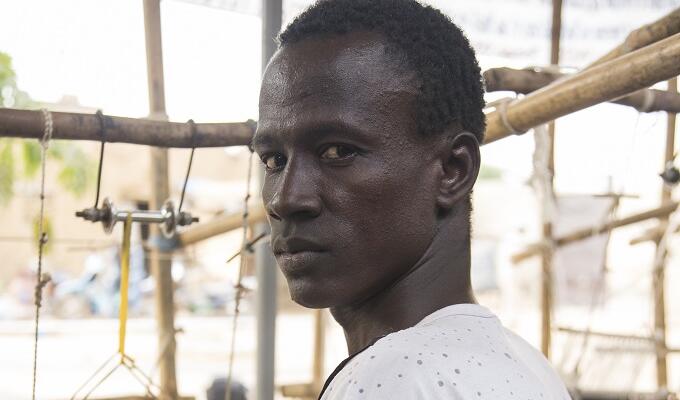

Weaving into fairness
How training in traditional weaving saves lives and, as a plus, the environment
Mali, like its neighbouring countries Burkina Faso and Mauritania in West Africa, is facing waves of migration due to political unrest and the resulting economic instability. With limited job and training opportunities in the North, especially for the young, Malians leave their homes in search of jobs in other parts of their country.
These internal migrants face extreme poverty in the light of no income and no chance of improving their situation.
‘Poverty affects us, and everyone migrates in search of a job’, says Hassane Sangho. The 30-year-old teaches weaving techniques he inherited through his ethnic group – Peul Maabo – with masterpieces displayed at the National Museum in Bamako.
But Hassane was not able to find a job in his home town of Saraféré in the North: ‘Two years ago, I left my village to come to Ségou because of the area’s precarious and insecure situation.’
With public schools closed due to the jihadist occupation, Hassane has been relying on his skills in weaving since the age of 14. Weaving is a tradition in Mali, with the first techniques born around 3000 b.c. and passed from generation to generation between nomadic men.
‘Each new generation learns from the master weavers. Once you have acquired a certain level of skills, you have the duty to teach the young yourselves’, explains Hassane.
Once in Ségou, Hassane heard about the Ethical Fashion Project that integrates displaced migrants under decent and secure working conditions. ‘I participated in the first training – and became a certified trainer after that thanks to my skills.’
Professional recognition was a life changer for the young Malian. ‘I now have a craftsman card with my professional status. The technicians assist us in developing new fabrics and producing orders for various brands. Our incomes are growing and the work is continuous. We also have orders from local customers thanks to the publicity of the project.’
Hassane and other weavers facing similar difficulties are now hopeful and at peace. ‘I am proud and very happy. I weave, I learn, and despite the displacement, I can support my family economically.’
Slow fashion for a better future
Slow fashion is a global trend in the Western world, especially in Europe, given the increased pressures of climate change and the consumerist behaviour of millions worldwide. Artisans skilled in the traditional ‘Bogolan’ (mud dyeing) technique can offer comparative and competitive advantages in a global fashion market where consumers demand environmentally responsible sourcing and manufacturing, along with fair trade goods made in socially equitable working conditions. The trend for handmade artisanal products – made with love and backed by human stories – means that slow fashion is a viable means to replace fast, irresponsible fashion.
And it can help fight irregular migration: ‘A project such as the Ethical Fashion Initiative can help us make a living without being tempted by the perilous adventure outside of the borders’, confirms Hassane.



